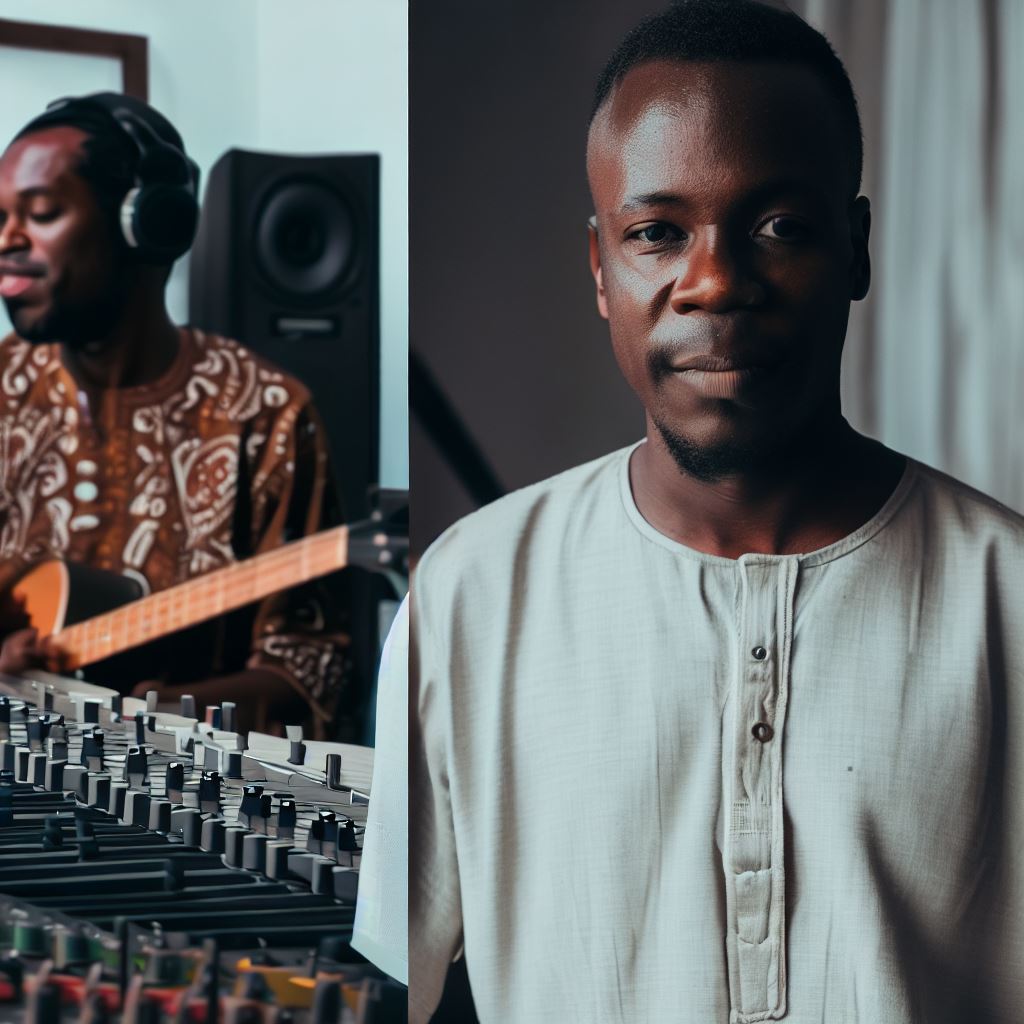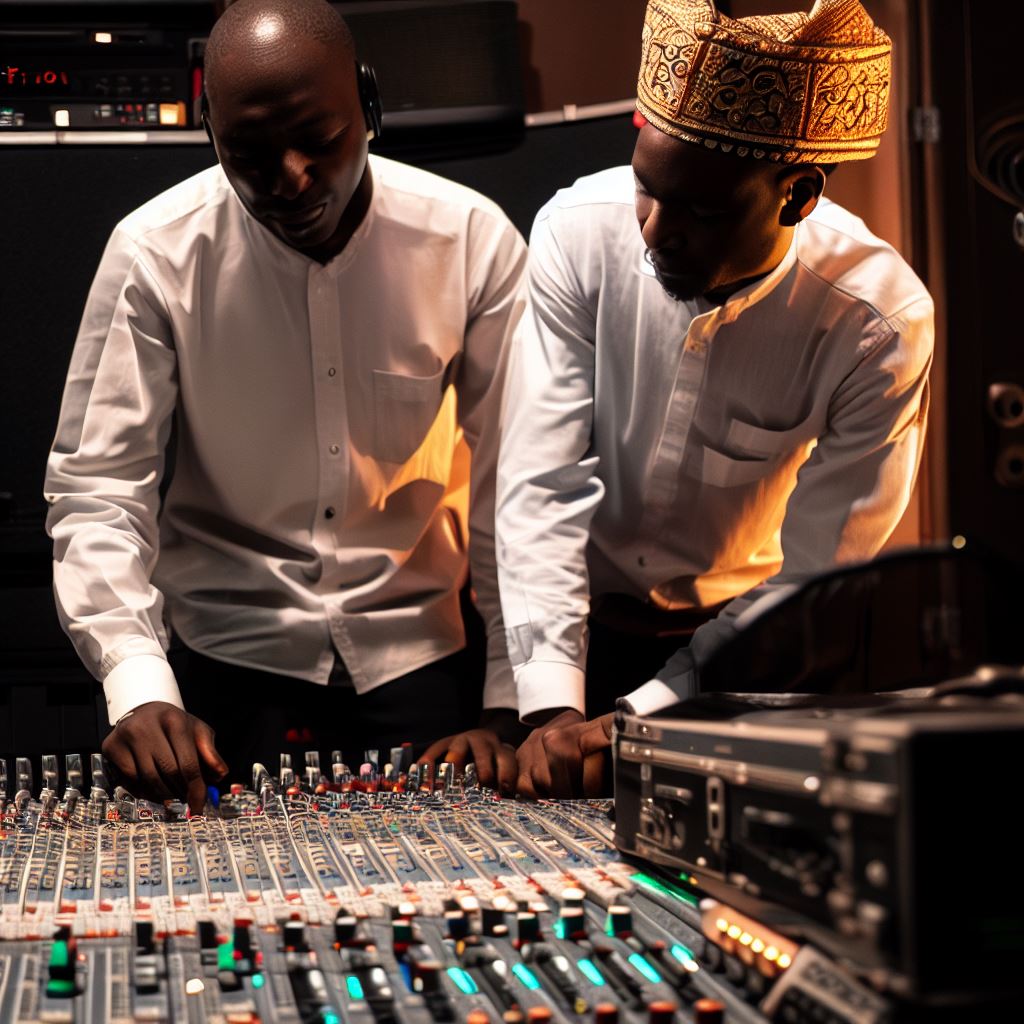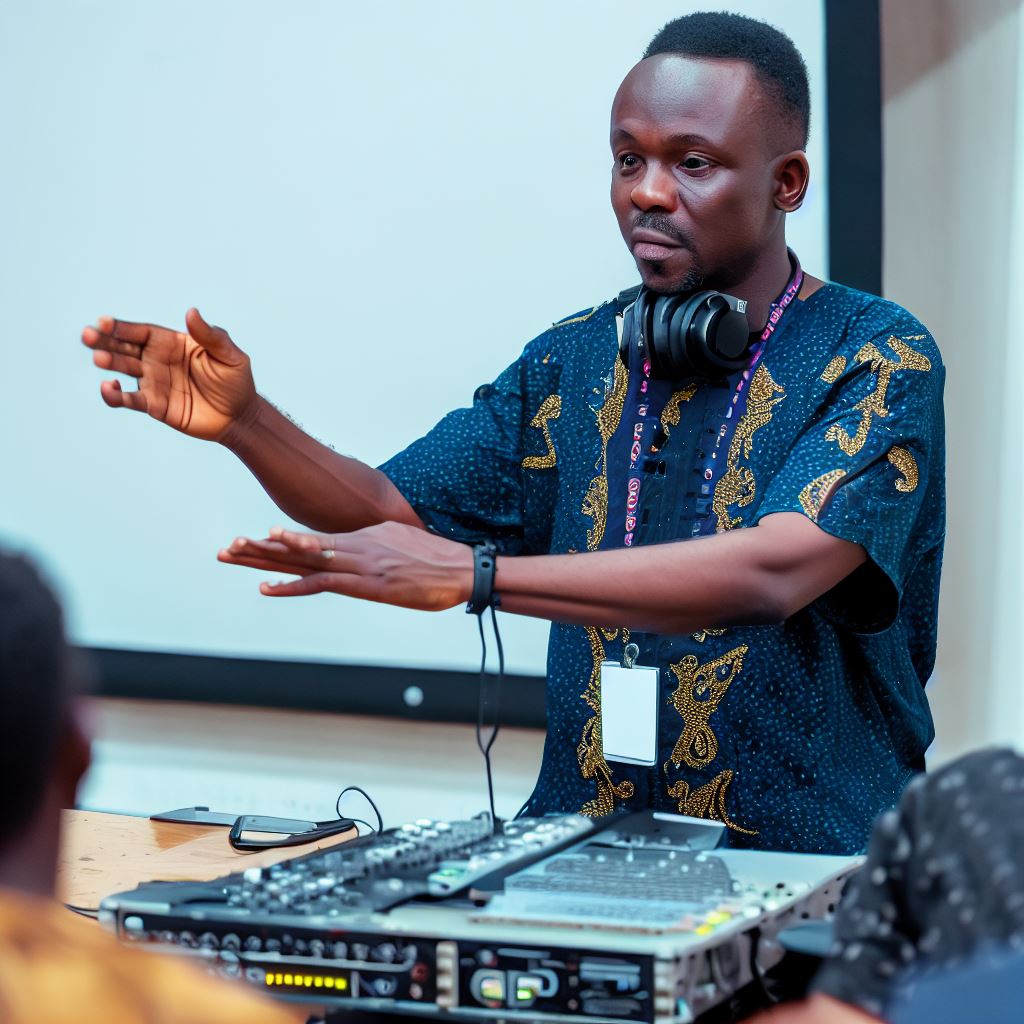Introduction
Let’s explore music schools in Nigeria: Training film composers.
Music schools in Nigeria are training film composers to meet the growing demand for skilled professionals.
In the heart of Nigeria’s vibrant cultural landscape, a burgeoning industry is quietly taking root, poised to shape the future of music and film composition.
Music Schools in Nigeria are emerging as crucibles of talent, dedicated to the specialized craft of training film composers.
These institutions stand as beacons, nurturing artistic expression and technical prowess, preparing a new generation to score the narratives that will captivate global audiences.
In this dynamic ecosystem, students are not merely taught, but mentored by maestros who themselves have woven symphonic tapestries for the silver screen.
Training film composers in Nigeria is crucial for developing the local film industry and promoting cultural representation.
Through a harmonious blend of tradition and innovation, these schools are not only refining musical virtuosos, but also sculpting the sonic soul of Nigeria’s cinematic legacy.
Overview of Music Schools in Nigeria
These music schools play a significant role in nurturing talented individuals and transforming them into skilled musicians and composers.
They aim to provide a structured and professional environment for aspiring musicians to develop their skills and pursue a successful career in the music industry.
A. Number and types of music schools in Nigeria
The number and variety of music schools in Nigeria indicate the growing interest in music education and the recognition of its importance in the country.
These institutions cater to the diverse preferences and musical aspirations of students, offering courses in classical, contemporary, and traditional African music.
B. Notable music schools in the country
The MUSON School of Music is highly regarded for its rigorous training programs and experienced faculty.
It offers a wide range of courses, including music theory, composition, voice training, conducting, and instrumental studies.
Students receive holistic education that prepares them for a career in music performance or composition.
Similarly, Tenstrings Music Institute is known for its focus on contemporary music genres such as pop, rock, jazz, and R&B.
Its curriculum encompasses performance, songwriting, music production, and music business management.
The institute has produced successful musicians and performers who have made a name for themselves in the Nigerian music industry.
The PeterKing College of Music stands out for its emphasis on composition and arranging.
It provides students with opportunities to explore their creative talents and develop their unique musical styles.
The college boasts a dedicated composition department, where students receive personalized guidance and mentorship.
In addition to these renowned music schools, various other institutions contribute to the vibrant music scene in Nigeria.
The Musical Society of Nigeria (MUSON) Music School specializes in classical music education and serves as a hub for classical music enthusiasts in the country.
Furthermore, schools such as Chrisland School of Music and Teni-Olu School of Music provide music education to students from elementary to secondary levels, ensuring a strong foundation and early exposure to music.
In a nutshell, Nigeria is home to a diverse range of music schools that cater to different musical disciplines and genres.
These schools play a vital role in shaping the music industry by nurturing talent and providing comprehensive education.
As the interest in music education continues to grow, these institutions will continue to make significant contributions to the development of music in Nigeria.
Read: African Rhythms: How Nigerian Film Composers Use Them
The Role of Music Schools in Training Film Composers
A. Curriculum and courses offered
Music schools in Nigeria provide a comprehensive curriculum designed specifically for film composers.
Courses include music theory, composition, orchestration, film scoring techniques, and sound design.
Students also learn about the history and development of film music and analyze various movie scores.
The curriculum is constantly updated to stay relevant with the changing trends in the film industry.
Students are encouraged to explore different musical genres and styles to enhance their versatility.
B. Specializations and opportunities for film composers
Music schools offer specialized programs and workshops focusing on film composition.
These programs help students develop their skills in creating music that enhances the emotion and storytelling in films.
Opportunities are provided for students to work on real-life film projects, collaborating with film students and directors.
Students learn to adapt their compositions to different genres, moods, and film aesthetics.
They also have the chance to attend film festivals and industry events to showcase their work and network with professionals.
C. Faculty members and industry professionals
Music schools in Nigeria have highly qualified faculty members with extensive experience in film composition.
These faculty members are often industry professionals themselves, providing students with valuable insights and practical knowledge.
Guest lectures and workshops are regularly organized, inviting renowned film composers and industry experts.
Students have the opportunity to learn from and interact with these professionals, further enriching their learning experience.
Faculty members and industry professionals also assist students in building connections and finding internships or job opportunities in the film industry.
In short, music schools in Nigeria play a crucial role in training film composers.
The curriculum and courses offered provide a well-rounded education that equips students with the necessary skills and knowledge.
Specializations and opportunities cater specifically to the needs of film composers, allowing them to develop their unique artistic voices.
The presence of experienced faculty members and industry professionals ensures that students receive guidance from experts in the field.
Music schools not only nurture the technical and creative abilities of aspiring film composers but also provide a platform for them to connect with the film industry.
Read: Traditional Music’s Influence on Nigerian Film Scores
Challenges and Limitations
The challenges and limitations faced by music schools in Nigeria in training film composers are numerous.
A. Lack of proper infrastructure and equipment
One significant obstacle is the lack of proper infrastructure and equipment.
Without state-of-the-art music production studios and recording facilities, students may struggle to gain hands-on experience in composing music for films.
Additionally, the limited availability of musical instruments and equipment necessary for film composition training further hinders students from fully exploring their creative potential.
The inadequate provision of specialized classrooms or rehearsal spaces specifically designed for film composers is another challenge.
These dedicated spaces would allow students to immerse themselves in their craft and collaborate with fellow musicians, directors, and filmmakers.
Unfortunately, the absence of such spaces restricts the opportunities for practical learning and development.
B. Limited funding and scholarship opportunities
Furthermore, the funding and scholarship opportunities for aspiring film composers in Nigeria are also limited.
Insufficient financial support from the government for music schools and film composition programs hampers the growth and advancement of talented individuals.
The lack of scholarships and grants tailored specifically for film composers further exacerbates the financial constraints faced by students seeking to pursue a career in this field.
C. Limited recognition and support for film composers
In addition to financial challenges, film composers also struggle with limited recognition and support.
Many individuals in Nigeria fail to understand and appreciate the vital role that film composers play in enhancing the cinematic experience.
Without sufficient acknowledgment of their artistic and creative contributions, film composers may struggle to gain opportunities and exposure in the industry.
Moreover, limited platforms for showcasing the work of film composers in mainstream media hinder their ability to reach a broader audience.
The underrepresentation of film composers in awards and recognition ceremonies further underscores the lack of support and visibility for this profession.
In fact, music schools in Nigeria face significant challenges and limitations when it comes to training film composers.
Addressing these issues requires investment in infrastructure and equipment, increased funding and scholarship opportunities, as well as a greater recognition and support for the artistic contributions of film composers in the country.
Read: Breaking Down the Film Composer Salary in Nigeria

Successful Film Composers from Nigerian Music Schools
A. Notable alumni and their achievements
- Femi Kadri: Notable for his composition in the award-winning film “The Figurine” directed by Kunle Afolayan.
- Michael Ogunlade: Composed the score for the popular Nigerian film “October 1” directed by Kunle Afolayan.
- Adekunle Adejobi: Known for his work in the film “The CEO” directed by Kunle Afolayan, which received critical acclaim.
- Tunde Jegede: Composed the score for the film “Maami,” directed by Tunde Kelani.
B. Impact of music education on their careers
- Music education received at Nigerian music schools has played a significant role in the success of these film composers.
- The training they received equipped them with a solid foundation in music theory, composition techniques, and film scoring.
- Exposure to different genres of music during their education allowed them to develop a unique style and versatility.
- The practical experience gained through assignments and projects in music schools gave them the necessary skills to excel in the industry.
- Networking opportunities provided by music schools helped these composers connect with filmmakers and establish fruitful collaborations.
- Guidance and mentorship from experienced faculty members enabled them to refine their craft and reach new heights in their careers.
- Access to state-of-the-art facilities and equipment in music schools enhanced the quality of their compositions.
- Rigorous training and discipline instilled in them during their time in music schools prepared them to meet the demands of the film industry.
- The recognition and validation that come with graduating from reputable music schools bolstered their credibility as film composers.
- The constant exposure to diverse musical styles in Nigerian music schools gave these composers an edge in creating unique soundtracks that resonate with the audience.
In essence, Nigerian music schools have produced talented and successful film composers who have made a significant impact on the Nigerian film industry.
The notable alumni mentioned above are just a few examples of the immense talent nurtured in these institutions.
The music education they received has been instrumental in shaping their careers and enabling them to create captivating and memorable film scores.
Through their achievements, they have not only brought recognition to themselves but have also contributed to the growth and development of the Nigerian film industry as a whole.
Read: Exploring the Role of Film Composers in Nollywood
The Impact of Film Composers on Nigerian Cinema
A. Importance of film scores in enhancing cinematic experience
Film scores play a crucial role in enhancing the overall cinematic experience for the audience.
With carefully composed music, film composers help create emotional connections and intensify storytelling.
The right musical composition elevates suspense, romance, action, and other crucial elements in Nigerian cinema.
Without the contribution of film composers, movies would lack the impactful and immersive experience they provide.
The combination of visuals, acting, and music transport viewers to a different world and engage their senses.
B. Successful collaborations between film composers and directors
The partnership between film composers and directors is pivotal in achieving a well-rounded cinematic masterpiece.
Directors rely on film composers to understand their vision and translate it into a powerful musical score.
Through effective communication, composers bring out the desired emotions and enhance the film’s narrative.
The collaboration allows for the exploration of creative ideas and experimentation to find the perfect musical expression.
Successful collaborations between film composers and directors result in films that resonate deeply with the audience.
C. Recognition and awards received by Nigerian film composers
Nigerian film composers have gained recognition both locally and internationally for their outstanding work.
The Nigerian film industry regularly celebrates the achievements of its composers through awards ceremonies.
These awards acknowledge the contribution of film composers in shaping Nigerian cinema.
Some renowned Nigerian film composers have received prestigious international accolades for their exceptional talent.
The recognition received by Nigerian film composers highlights their artistic prowess and the value they bring to the industry.
Publish Your Professional Profile, Business or Brand
Showcase your expertise, gain trust, and boost visibility instantly on Professions.ng.
Publish NowIn general, film composers play a significant role in Nigerian cinema by enhancing the cinematic experience, collaborating successfully with directors, and receiving recognition and awards.
Their compositions elevate the emotional impact of films and captivate audiences, making them an integral part of the filmmaking process.
Through their creative work, film composers contribute to the growth and development of Nigerian cinema, bringing it on par with international standards.
You Might Also Like: Understanding The Role of Performers’ Agents in Nigeria
Future Prospects and Recommendations
A. Improving infrastructure and resources in music schools
Music schools in Nigeria should invest in upgrading their facilities and equipment.
State-of-the-art studios and sound libraries should be made available to students.
Increased funding should be allocated to music schools to ensure access to quality instruments.
Regular maintenance and upgrades of existing infrastructure should be prioritized.
B. Collaboration with the film industry and other institutions
Music schools should establish partnerships with the Nigerian film industry.
Collaborative projects between film composers and student composers should be encouraged.
Guest lectures and workshops by industry professionals can provide valuable insights and mentorship.
Music schools can also form alliances with other institutions, such as universities or cultural centers.
These partnerships can create opportunities for internships, joint research projects, and exchange programs.
C. Advocating for recognition and support for film composers
Music schools should actively raise awareness about the importance of film composers.
Advocacy campaigns should be launched to highlight the artistic and cultural contribution of film music.
Supportive policies, grants, and scholarships should be established specifically for film composition students.
Public events showcasing the work of film composers should be organized to showcase their talent and creativity.
In review, the future prospects for music schools in Nigeria training film composers are promising, but there is room for improvement.
To enhance the training of film composers, it is crucial to invest in improving infrastructure and resources, foster collaboration with the film industry and other institutions, and advocate for recognition and support for film composers.
By implementing these recommendations, music schools in Nigeria can play a vital role in nurturing and producing talented film composers who contribute to the growth and development of the Nigerian film industry.
Learn More: Negotiation Tactics for Artists’ and Performers’ Agents
Conclusion
Music schools in Nigeria play a crucial role in training film composers. These schools provide a structured education and professional guidance to aspiring composers.
They offer courses in music theory, composition, orchestration, and sound design. Students learn how to create music that enhances the emotional impact of films.
The demand for film composers in Nigeria is increasing, creating more opportunities. Music schools have the potential to nurture and cultivate talent in film composition.
They can provide students with the necessary skills and knowledge to succeed in this industry. The exposure to different genres and styles of music broadens their creative horizons.
Music schools also connect students with professionals in the film industry, boosting their career prospects. By investing in music education, Nigeria can create a thriving pool of skilled film composers.
In fact, music schools in Nigeria are crucial for training film composers. They offer a structured education, guidance, and opportunities to aspiring composers.
By nurturing and developing talent in this field, these schools have the potential to contribute significantly to the growth of the film industry in Nigeria.
With the increasing demand for film composers, investing in music education can create a pool of skilled professionals who will enhance the quality of Nigerian films.




